Industry
TELDAT has also designed and developed crisis management solutions
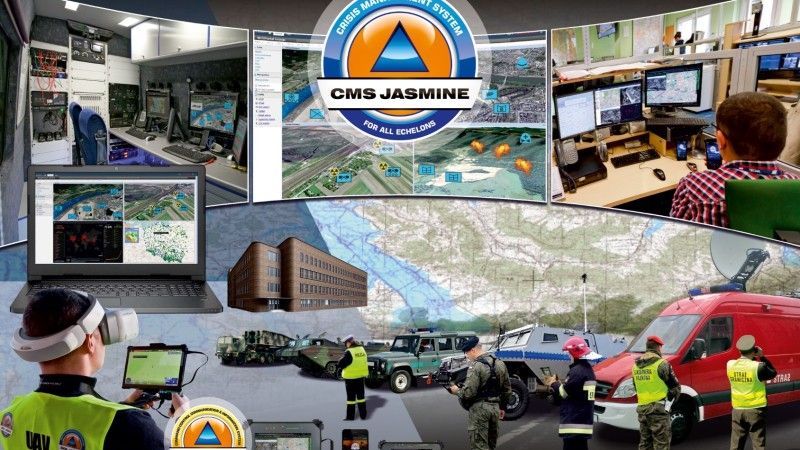
Crisis Management System JASMINE (CMS JASMINE) is an innovative, wide area solution dedicated to NATO, EU and national crisis management structures. The system provides the comprehensive ICT support of public administration and Armed Forces including Territorial Defence in crisis operations, rescue and preventive actions. The solution enhances the management, planning, command and control as well as monitoring of political, military and non-military threats.
The system is aimed especially at all echelons of Crisis Management Centers, the management structures of the Police, Fire Brigade, Border Guard, Emergency Medical Services, Crisis Management Centers, as well as fits to needs of armed forces (Emergency Command Centers and Task Groups).
CMS JASMINE consists of software of the Crisis Management System – CMS C3IS JASMINE (the main component of presented solution) and dedicated ICT hardware, providing global crisis management. The system ensures the monitoring of the resources assigned to crisis operations within the whole country.
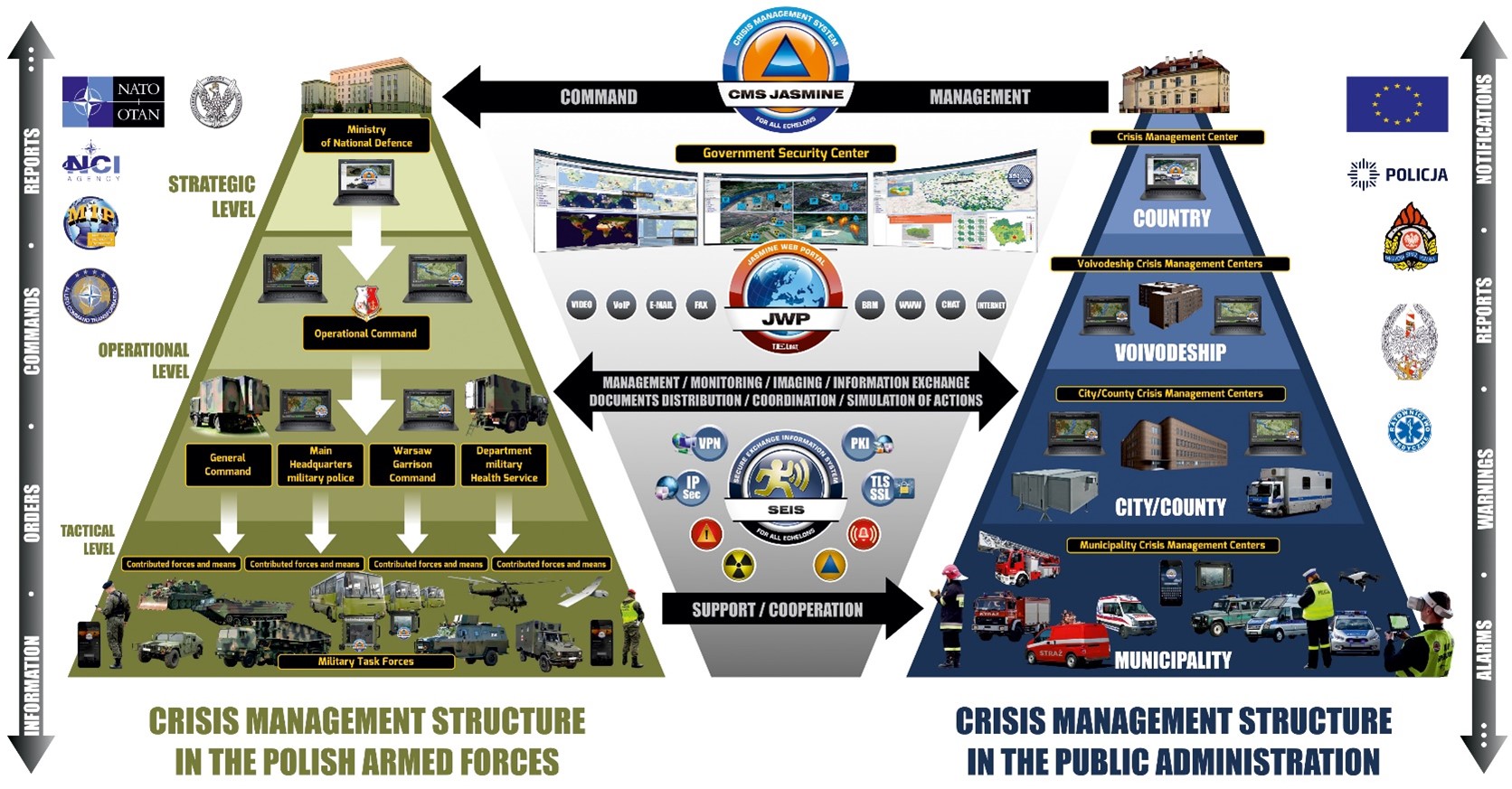
https://defence24.com/teldatthe-global-level-of-the-polish-c4isr
Main advantages:
- joint situational awareness at workplaces (also in mobile conditions) within the scope of e.g.
- ongoing presentation of the distribution of forces and resources useful in crisis management,
- ongoing monitoring of activities and the state of forces and resources,
- distribution of identified people, environments and objects posing a crisis risk (also related to illegal attempts and facts of crossing the border),
- updating data with the use of the existing systems operating in state services,
- updating data at each workstation (according to the level of approved authorizations),
- deployment of potentially hazardous objects (e.g. industrial plants using toxic industrial agents);
- efficient transmission of commands and orders as well as reports on their implementation;
- automatic implementation of information exchange in written and graphical form in a hierarchical (vertical) structure and as part of cooperation (horizontal);
- ensuring simultaneous work on common documents;
- ensuring the use of information obtained from the systems (databases) used by state services (Police, State Fire Service, Border Guard, rescue services, etc.) with agreed access level – it is possible to extend the scope of information exchanged and integrate with various systems of these services through appropriate interfaces access of these systems;
- enabling the assessment of potential / anticipated hazardous events (e.g. the extent of floods, fires and the release of hazardous materials);
- guaranteeing automatic recording and archiving of all activities performed in the system;
- ensuring the use of archived situations for the analysis, evaluation and carrying out of crisis management exercises (After Action activities), etc.
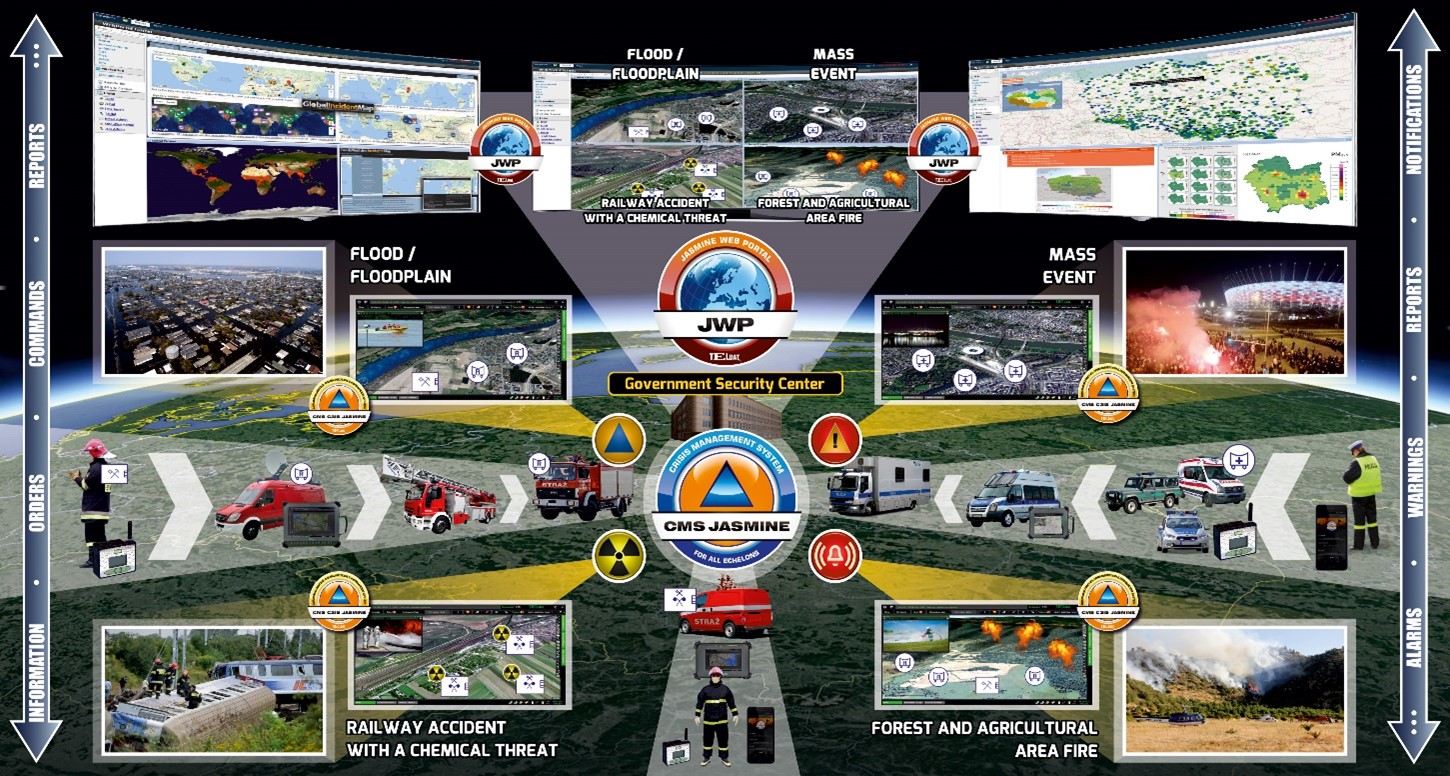
https://defence24.com/development-of-the-polish-tactical-terminals
Main features:
- planning, command support, coordination and control of operations, thorough optimization of solutions (calculation, verification and simulation tools), dynamic resource lists, simulation of courses of action, logistic plans, etc.
- gathering, processing, aggregation and distribution of information about rescue operations carried out in the following scope:
- incidents(e.g. disturbance of security and public order),
- events(e.g. pollution of water intake and forest fire),
- threats(e.g.: epidemiological, terrorist, migration and constructional),
- terrain(e.g.: flood areas, embankment status and chemical contamination),
- population(e.g. location and number of people staying in buildings or regions of operation to provide assistance),
- resources (e.g.: human, objects, units, protective equipment);
- current and automatic reports about last actions and available resources in rescue teams;
- effective distribution of important information (including alerts, messages, reports, orders) to selected groups of recipients (troops, rescue teams, people) situated in any localization;
- cooperation with other systems of governmental organizations (Government Security Center, Institute of Meteorology and Water Management, National Fire Brigade, the Police, National Emergency Medical Services, Border Guards) via application of centralized WWW portal – Web Client through sharing of documents and bilateral information exchange with CMS JASMINE;
- high level of security provided through multi-level securityof exchange information and data processing (also in classified networks) by the use of: labeling, encryption, authentication and access control mechanisms (according to NATO XML Labelling concept, Public Key Infrastructure, VPN, IPSec, and TLS/SSL);
- presenting and monitoring of actual rescue / crisis situations on digital maps based on GPS information, data entered by soldiers / officers / rescuers, as well as video images and photos from the actions;
- integration and cooperation with UAV for current video streaming from areas of: border lock, quarantine, search / rescue operations, fires, flood etc.;
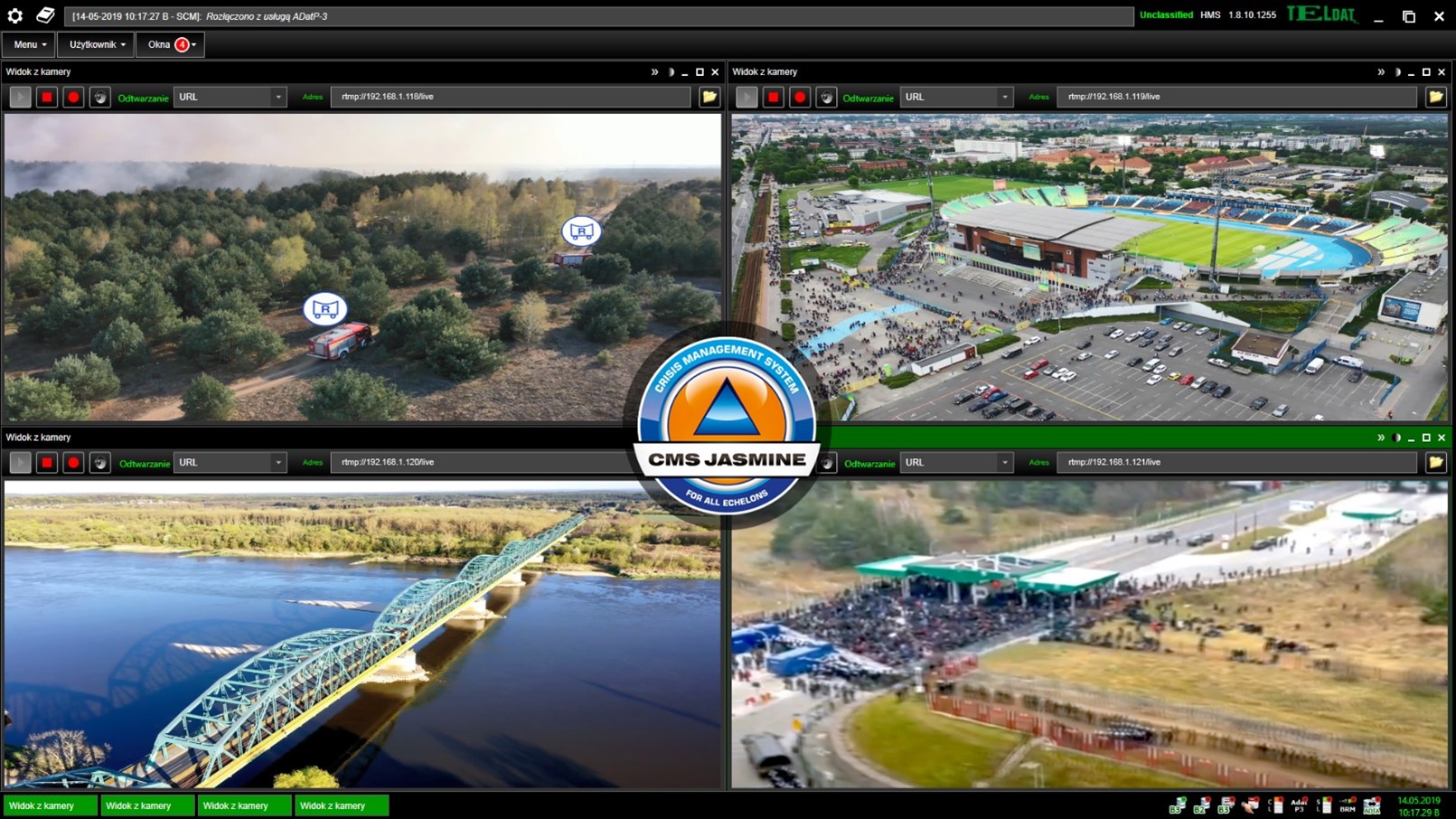
- the modular architecture of the system providing: server and client software, features and services, dedicated to personnel operates on the global scale (e.g. within the whole country) and local activities (e.g. mobile operations in terrain). The system provides flexible and easy extension with new features, dedicated services and additional workplaces;
- interoperability of the system which guarantees cooperation with Polish MoD, NATO and EU due to the following implemented standards: MIP DEM B3.1, NFFI & FFI-MTF (STANAG 5527), Link 16 - JREAP-C (STANAG 5516, STANAG 5518), VMF, NVG & JIPS, ADatP-3 (B11C/F, B12.2, B13.1 & B14) - STANAG 5510, JDSSEM (STANAG 4677), BRM (author’s and unique Battlefield Replication Mechanism), HLA, DIS, SMTP, CBRN (ATP45), OTH-GOLD, WMS & WMF and APP-6(A)/(C);
- wide range of network services: VoIP, VTC, audio/video streaming (RTMP), e-mail, WEB portal, CHAT, FAX;
- automatic and efficient exchange of information through anyradio media (including low bandwidth and high error rate);
- cooperation with available media communication, e.g. telephone GSM/LTE/CDMA network and public PSTN and VoIP;
- management of system resources (services, ICT devices and users accounts);
- automatic data replication and archiving services in the entire system;
- quick and easy connection of rescue personnel and crisis services to the system, via a mobile application installed on typical smartphones. It significantly automates the process of receiving direct information from rescuers during actions;
- monitoring of quarantined population via tracking their whereabouts;
- cooperation with simulation systems providing: multiple scenarios processing of many different situations, course of actions, behaviors and decision making results. It enables Users training with the use of the system during any crisis situation.
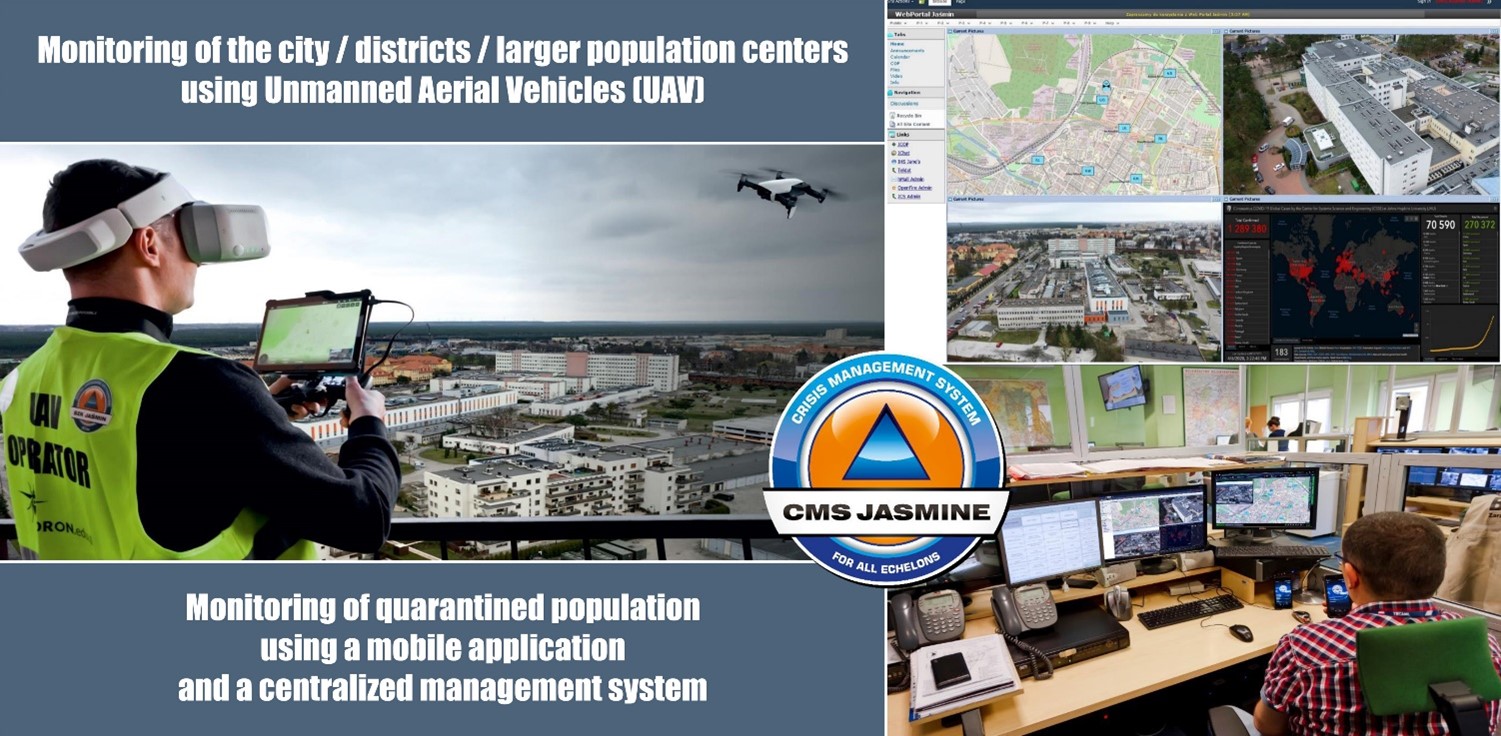
https://defence24.com/jasmine-system-with-air-platforms-support
System and users security
CMS JASMINE is characterized by a high level of security by ensuring multi-level information exchange and processing (including in classified networks), due to the use of appropriate mechanisms: labeling, encryption, authentication and access control in ICT networks (e.g. in line with the NATO XML Labeling concept, Public Key Infrastructure, VPN, IPSec and TLS/SSL).
As part of the organization of the protection of ICT systems intended for the processing of national classified information in the CMS JASMINE, communication may also be performed using the currently existing network infrastructure and access circuits from public operators after the use of additional encryptors (provided by the system organizer) that meet the requirements of: Internal Security Agency (ABW) or Military Counterintelligence Service (SKW).
https://defence24.com/continous-development-of-polish-automated-c2-systems-for-military-operations
Research, implementation and scope of use
CMS JASMINE is one of the main systems / software components of C3IS JASMINE (Multidomain Command, Control, Communication & Information System of Systems for all echelons / crisis management structures). This comprehensive solution is implemented and successfully used in in the Polish Armed Forces, especially in the HMS C3IS JASMINE version (software / Headquarters Management System for Operational and Tactical Level.
CMS JASMINE, as a separate / independent and comprehensive system, has been successfully tested for several years and used mainly in:
- The War Studies University (formerly the National Defense Academy) in the Laboratory of Command, Control, Communication & Information Systems, as well as exercises and workshops related to crisis management, during which this solution was used to implement automated cooperation between military and civilian units (as a system compliant with the CIMIC concept - Civil-Military Co-operation);
- Kalisz Academy and the University of Applied Sciences in Nysa as part of the Automated Crisis Management Systems Laboratories and various types of exercises and workshops related to crisis management;
- The Crisis Management Center of the City Hall of Bydgoszcz, e.g. during international mass events.
CMS JASMINE also attracts the attention of: the National Security Bureau (BBN), several Voivodship and Marshal's Offices as well as many military units and institutions. It is also related to the current threats to the security of the Republic of Poland.
https://defence24.com/another-modernization-of-the-polish-military-in-the-ict-domain
Perspective and development possibilities
CMS JASMINE has a modular structure / system architecture, providing dedicated: server and client software, functionalities and services for personnel operating on a macro (e.g. country) and micro / local scale (e.g. mobile in the field). Thanks to this, the system enables any, flexible and easy expansion with new possibilities, dedicated services and additional workplaces.
The modular structure of the described system, ease of adaptation to the needs of a specific User, the ability to cooperate with other already existing systems and various means of communication make it fully compliant with the needs of integrated crisis management and provides modern tools and possibilities of broad and effective process support / procedures in this area.
In the context of the above, it is also important that the CMS JASMINE (especially its above-mentioned software):
- is a system / component of the aforementioned C3IS JASMINE, which has been successfully used by the Polish Armed Forces (mainly in the version of the above-mentioned HMS C3IS JASMINE, including their duty services of individual levels / ranks), who know this product well and have: many years of experience in the operation of this comprehensive solution, its numerous research and training laboratories as well as an unlimited number of licenses for the wide use of the product in question, also by the structures supervising the Polish Army and cooperating with it;
- is a fully Polish product, which guarantees complete safety of its use, efficient and effective service and further development;
- is manufactured by a producer with exceptional national competences and abilities (intensively built over 25 years in the country and abroad) to efficiently adapt this product to the current needs of entities and post-holders involved in crisis management. This contractor has performed all existing contracts with domestic and foreign contractors without any complaints and always ahead of schedule.
Main awards and honors for CMS JASMINE and its software:
- distinction awarded by Ministry of National Defence – in the competition of Innovations for Polish Armed Forces 2016 for the JASMINE platform, which the CMS JASMINE is also one of the main systems;
- the Defender award – in 2018 for the latest / significantly expanded version ofC3IS JASMINE, where CMS C3IS JASMINE is one of the main systems / software components;
- the GRAND PRIX award – in the State Security Leader Competition 2021 for CMS JASMINE;
- AIR FAIR 2019 award – also for C3IS JASMINE, where CMS C3IS JASMINE is also one of the main components.
Łukasz Apiecionek Ph.D., Eng., Professor at the Institute of IT at the Kazimierz Wielki University in Bydgoszcz, working as the Director at the Innovative IT Technologies Department TELDAT
